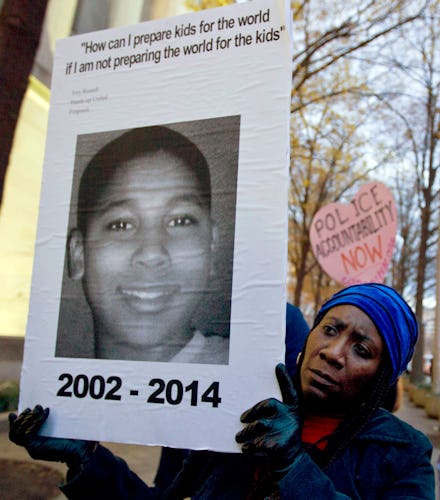The Real Reason Cops Thought Tamir Rice Was Older Than He Really Was

On Monday a grand jury in Cleveland decided not to indict the police officer who shot and killed 12-year-old Tamir Rice in Cleveland last year, or the police officer who accompanied him during the incident. The much-anticipated decision was met with a mix of horror and resignation from criminal justice reformers, who have seen the courts consistently fail to hold police officers accountable for killing unarmed black people in cities across the nation in the past year.
While the pattern of unaccountability has taken on a predictable rhythm, the tragedy of Rice's death was compounded by his youth. Rice was not yet a teenager, and the caller who reported him to the police said that he was "probably a juvenile" and the gun he was carrying was "probably fake." Those specific details were not conveyed to the responding police officers, one of whom shot him within seconds of arriving at the park Rice was playing at.
The police officers justified their hasty conduct in part based on the fact that they thought Rice was significantly older than he was. At 5 foot 7 and 170 pounds, Rice was large for his age. As the officers "prepared to face a possible active shooter in a neighborhood with a history of violence," according to prosecutor Timothy McGinty's description, in the moment they claim they perceived him as an adult.
But size is likely not the only thing that contributed to that snap judgment. As Christopher Ingraham pointed out at the Washington Post, there's a significant body of psychological research showing that race plays a huge factor in how law enforcement officers estimate the age and guilt of a suspect. He described a study published by the American Psychological Association last year:
In one experiment, a group of 60 police officers from a large urban police force were asked to assess the age of white, black and Latino children based on photographs. The officers were randomly assigned to be told that the children in the photographs were accused of either a misdemeanor or felony charge. The officers overestimate the age of black felony-suspected children by close to five years, but they actually underestimated the age of white felony-suspected children by nearly a year.
The study also included an experiment that observed mainly white female undergraduate students, and discovered that they found children equally innocent regardless of race up to 9 years old, but after the age of 10, black children were seen as "significantly less innocent" than other children.
"Children in most societies are considered to be in a distinct group with characteristics such as innocence and the need for protection. Our research found that black boys can be seen as responsible for their actions at an age when white boys still benefit from the assumption that children are essentially innocent," University of California psychology professor Phillip Atiba Goff, one of the authors of the study, said in a release.
This phenomenon of abbreviated childhood for black boys dovetails naturally with another, broader pattern of perception of black males in America — systematic exaggeration of their size and power. Michael Brown, the 18-year-old who was killed in Ferguson, Missouri last year was described by the officer who shot him as a "demon" possessing superhuman strength and a terrifyingly facial expression. Describing black people as having supernatural physical capability is a trope that has prevailed in popular American culture since its inception and still holds sway today. The disturbing corollary of this idea is that black people should be considered especially fearsome in conflict scenarios — and especially capable of withstanding violence.
The tragic implications of all this are that black children are forced to grow up all too soon. Or if they're particularly unlucky, they won't get the chance to grow up at all.